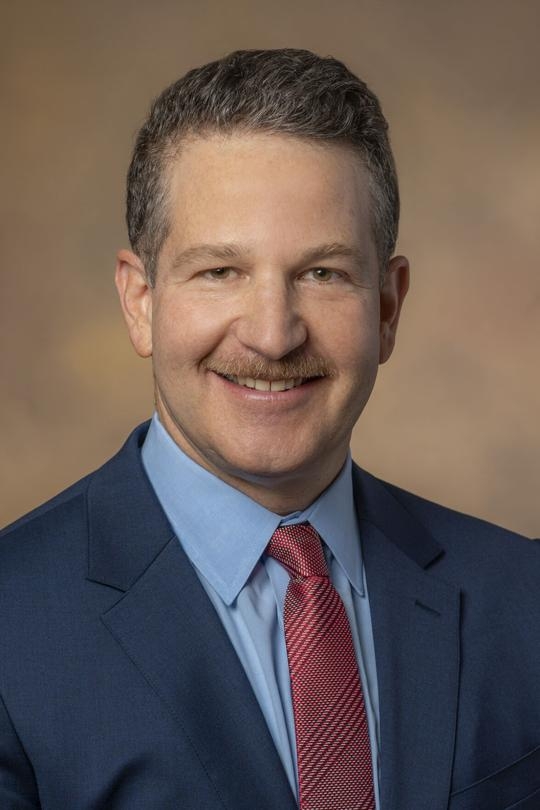Dr. Jordan Karp , a geriatric psychiatrist, has spent his career trying to improve care for older people with major depression and mood disorders, especially those facing resistant depression. And he loves his job or rather, jobs.
, a geriatric psychiatrist, has spent his career trying to improve care for older people with major depression and mood disorders, especially those facing resistant depression. And he loves his job or rather, jobs.
Karp is a professor and chair of University of Arizona College of Medicine’s Department of Psychiatry and the clinical service chief of behavioral medicine at Banner University Medical Center and Group in Tucson.
Karp’s passion for his specialty began in 1992. As a newly-minted college graduate, he encountered Dr. Charles F. Reynolds, a geriatric psychiatrist, who would become his mentor and remains a colleague and friend. Working together on a project studying predictors of response and late-life depression “really hit home,” he said.
Half of older adults taking antidepressants don’t respond to first or second line medication, Karp explained. Trials on the medication were originally done with healthy, younger adults, whose brains are different. Older adults have neurodegenerative changes, vascular changes and face psychosocial issues that many younger patients don’t. Those factors can be isolation and loneliness, worsening medical conditions and poverty.
“This has been the focus of my career over the past 25 years and really been my interest,” he said.
And his interest is fairly unique considering he’s one of only 2,000 geriatric psychiatrists in the United States. The work might not be the most popular field of medicine, but for Karp, “working with older adults is very meaningful.”
He values “the complexity and the gray areas” and the way it “requires me to attend to both mental illness and the psychology of aging, but also people’s changing medical burden, especially cardiovascular and metabolic diseases because these have an effect on the brain,” he said.
And in working with this population, he covers a lot of ground — from family systems to health care systems, and “figuring out creative ways to keep people comfortably at home and out of a nursing home or the hospital.” Some aspects of his work are akin to social work, he said, in that he has to consider the resources and entitlements his patients are due “so that they can live the best life possible to the end.”
These are some of the issues he’ll be presenting in “Preventing Cognitive Decline in Late-Life: Evidence-based ways to keep your brain healthy“ a webinar on Sept. 9. It is part of a free webinar series offered by the Institute for Mental Health Research, an Arizona nonprofit working on innovative research in mental health for the last 20 years.
Karp intends to keep his lecture tightly focused on cognitive decline in older adults and ways to prevent it. He’ll highlight a 2020 report of Lancet Commission on dementia prevention and intervention. The report lists 12 medical variables, which account for approximately 40% of the contributors to dementia risk. But given his limited time, he will highlight three that are particularly relevant for people to act on: the prevention and treatment of depression, improving physical activity and reducing excessive alcohol use, especially for those already showing signs of mild cognitive impairment.
Elaine Lazinsk of Scottsdale looks forward to hearing what Karp has to say. She predicts it will be “very informative.” She’s long supported the work of IMHR, and since the death of her husband to COVID last year, webinars like this “give me ways to cope with my new reality,” she said. “It’s been a struggle dealing with his loss and the acute loneliness.”
Debra Gettleman is also planning to watch Karp’s presentation. She’s heard him speak before, and with aging parents, she’s pretty sure “he will leave us with some juicy nuggets,” she said. The IMHR webinars she’s attended thus far have been “mind-blowing,” and she is inspired seeing “so much talent within Arizona,” she said. “IMHR is truly a local gem in the mental health arena.”
Nancy S. Heinrich, CEO for Jewish Senior Life, also applauds IMHR’s webinars, which are “relevant, substantive and research-based — something very important in today’s environment,” she said.
Karp will offer a Q&A after his talk and won’t be surprised if issues such as ageism, COVID or suicide come up — all topics he is well versed on. He hopes for a good discussion, which could lead people to realize much can be done to ensure older adults have better lives.
“This is not a black or white, or curative field of medicine,” Karp said. “In some ways it’s palliative; it’s to improve people’s quality of life, keep people from being depressed or anxious, stabilize their cognition and keep them as engaged in their communities and enjoying life as best they can.”
The Sept. 9 webinar is free and begins at 11 a.m. To register for the webinar, visit eventbrite.com.

